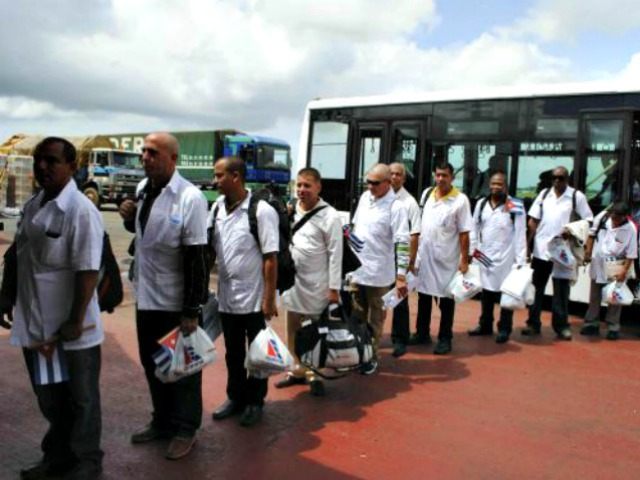A Cuban-born doctor who has been living in Chile for more than two decades tells the Panamerican Post doctors could not afford to buy “an egg a day” to feed themselves and often woke up in the middle of the night due to hunger pangs.
The communist Cuban government generates about $8 million a year in revenues through medical foreign exchange programs, sending doctors to underprivileged countries in exchange for direct payment and providing the doctors with only a living stipend. If the doctors are forced to work in especially unsafe conditions– such as those sent to Sierra Leone to fight the Ebola outbreak in West Africa that began last year– they may not be allowed to return to their families.
The situation has created a mass exodus of doctors from Cuba, all fleeing illegally, as Cubans are not allowed to move out of the country without special permission from the communist government. Supporters of the Castro regime have condemned doctors who do so. Last year, the New York Times derisively wrote about how Cuban doctors are not “the world’s neediest refugees and persecuted people” and the United States should reject them when attempting to defect.
Largely in response to the extensive list of misconceptions common about Cuban doctors around the world, Juan Afonso, a Cuban-born doctor who defected to Chile, tells the Panamerican Post that he would like to tell his story, living on $18 a month in the early 1990s and being awoken at midnight by hunger pangs. He says the decision to leave by any means necessary is a simple one to make: “If you are starving in your own country, and they [the regime] are having a laugh at your expense — with low wages, no chance for a raise, and unpaid shifts — what are you going to do?”
Condemning the “leeches and bureaucrats” who live off of the money generated by medical work abroad, Afonso explains that “the government has been making fun of us for a long time now” and that he found himself needing to leave Cuba because “I wasn’t born to be a slave.”
“I left because I could barely afford to buy a single egg to eat a day,” he says, adding that, as a doctor, he found himself routinely lacking necessary medical supplies. The lack of basic medical tools in Cuba has led many doctors to find themselves unable to work in well-stocked hospitals when sent to travel the world. The nation of Tuvalu, for example, expelled its Cuban doctors from the country for “incompetence” following a number of malpractice incidents.
“Many of us would wake up around midnight from hunger pains, and no one ever gave us anything; maybe a slice of bread, at the most,” Afonso adds.
He attributes his decision to defect partially to beginning to listen to Radio Martí, a publicly-funded American news network that broadcasts news of interest to Cubans and the exile community out of Miami. Radio and TV Martí are often the only non-state-controlled media outlets that Cuban nationals can access, and a main source of unbiased information from the United States.
“A friend of mine, who happens to be a prosecutor, told me I should stop [criticizing the regime], because they would put me in jail,” Afonso recalls. Instead of silencing himself, he found a way to leave.
The Castro regime has made clear it fears the influence of Radio and TV Martí. On multiple occasions following President Obama’s decision to issue a number of diplomatic concessions to the Castro regime in December 2014, Raúl Castro has called for President Obama to censor the Martí broadcasts, which would require him to violate the First Amendment of the U.S. Constitution.
Cuban doctors no longer make what they did when Afonso worked there– the Castro regime recently gave them a pay raise to $64 a month— and it may soon be possible that, thanks to President Obama, they will be less welcome in the United States. The 2006 Cuban Medical Professional Parole Program allows doctors to legally reside in the United States following their defection elsewhere and expedites the exile process. It has long irked media supporters of the regime, like the New York Times, whose editorial board has called the program unfair to the Castro regime. A report this week in Spanish newspaper El País indicates that the White House is considering a way to eliminate the program entirely on the request of the Castro regime.

COMMENTS
Please let us know if you're having issues with commenting.